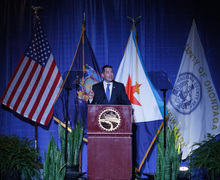Roth: Catcalling, street harassment portray machismo culture in Chile
In an average 40-minute commute to my class, I’ll get catcalled from the construction workers across from my bus stop. Men will whistle and say things to me while walking from my bus to the metro. Then on the metro or the bus, creepy men will stare at me and the real weirdos will wink.
This catcalling is an unfortunate manifestation of the machismo culture in Chile. Even though Chile’s president is a woman, the machismo culture is still strong in the Latin American country. But this culture presents itself in friendly ways — my host dad will open the car door for me and men will let me ahead of them sometimes when getting on the bus.
Unfortunately, most of the machismo culture is seen in the way men objectify women on the street. Imagine the clicking noise that people make at a dog — that’s what women hear multiple times a day. Random men on the street will say “hola” or more offensive Spanish phrases. An older man followed my friend and I for a block or two, saying that he loved us and wanted to marry us. To make the situation creepier, it happened at 5 p.m.
Some Chilean women find these instances to be compliments. But to a lot of Chilean women and myself, they violate our personal space and make us uncomfortable.
People shout from their cars. When I’m speaking English, the harassments turn into English phrases. “Hey, baby.” “How are you doing?” “Where are you from?”
According to my friends who look more foreign with blonde hair and blue eyes, the harassment is worse. My brown hair, brown eyes and olive-toned skin help me blend in, even though my origins are obvious once I speak. But in a society that favors lighter features, foreigners with those characteristics will get more harassment.
Sad to say, I’ve become used to this machismo culture in the streets. I’ve learned to tune it out. But it still catches me off guard when it’s really obnoxious.
When I first arrived in South America, all of the harassment shocked me. Perhaps if I had lived in a city larger than Syracuse, I would have been more accustomed to the street harassment. However, I was only used to hearing “Hey, pretty lady” from Gertis on Marshall Street.
The catcalling has never made me feel unsafe, except for when the older man followed my friend and me. Overall Santiago is a very safe city — one of the safest in Latin America. I’ve never felt unsafe when walking around at night. My friends from larger cities like Philadelphia or Miami consider Santiago to be safer than their home cities because there’s less gun crime.
If I had to get robbed, I’d prefer to do so in Chile. In Santiago when your phone or wallet gets stolen, you realize it after it happens. Pickpockets sneak their way around on the metro, on the bus or in crowded public spaces. In the United States, you’ll probably get a gun pointed at you and your possessions taken.
Here, the pickpocketing is more of an annoyance than a real threat. I have to make sure I’m holding my purse or backpack tight to my body. I can’t put anything of value in any outside pocket. Then again, those from cities larger than Syracuse probably are used to this.
Even though the difficulties of pickpocketing and machismo culture are common here, Santiago has much more to offer than these negative aspects. I love this city and the people here. Each country, the United States included, can have an ugly face to it. And sometimes that ugly face looks like the creeper who makes objectifying comments.
Danielle Roth is a junior majoring in magazine journalism and international relations. She is following her desires for good food and adventure in Santiago, Chile. Email her at dlroth@syr.edu or tweet at her @danielleroth_.
Published on November 11, 2014 at 12:01 am





